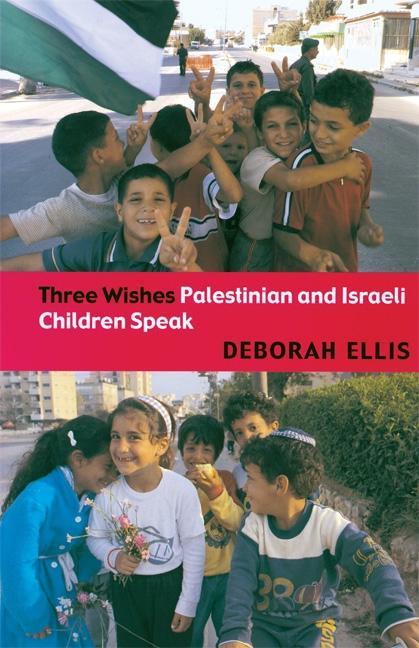Book Descriptions
for Three Wishes by Deborah Ellis
From Cooperative Children's Book Center (CCBC)
In her introduction to this affecting collection of interviews with Palestinian and Israeli children, Deborah Ellis writes: “The war in the Middle East has been going on for so long...that it often seems it will continue forever. But war, like almost everything else humans do, is a choice...The children in this book talk about how the choices other people have made have affected their lives. The history of the area and its people is a weight that has been placed, none too gently, on their shoulders.” Perhaps not surprisingly, the interviews that follow are more disheartening than heartening as they reveal what war and living under the threat of violence has done to many—at least many of these—children and young adults. Their ability to extend compassion and understanding to others has been compromised by the lack of compassion and understanding they feel in their own lives living under oppression (for some) and the constant threat of violence (for all). They are achingly childlike and familiar in the likes and dislikes that all children can speak to with passion: food, colors, brothers and sisters. But many also speak passionately about those they see as the enemy: tragically, it’s one another. Not every child is bitter, a few are dispassionate, and some hold onto idealism despite all they’ve seen and heard. Ellis ends with one such young adult, an 18-year-old Israeli peace activist whose idealism is tempered with pragmatism: “We will make our own peace, just as we have made our own war.” It’s a hopeful ending to a painful, honest examination of one part of the cost of the conflict in the Middle East. (Ages 12–18)
CCBC Choices 2005 . © Cooperative Children's Book Center, Univ. of Wisconsin - Madison, 2005. Used with permission.
From the Publisher
Deborah Ellis's enormously popular Breadwinner trilogy recounted the experiences of children living in Afghanistan; now Ellis turns her attention to the young people of the Israeli-Palestinian conflict. After visiting the region to conduct interviews, she presents their stories here Ñ in their own words. Twelve-year-old Nora, eleven-year-old Mohammad, and many others speak directly about their lives Ñ which prove to be both ordinary and extraordinary: They argue with their siblings. They hate spinach. They have wishes for the future. Yet they have also seen their homes destroyed and families killed, and live amidst constant upheaval and violence.
This simple, telling book allows young readers everywhere to see that the children caught in this conflict are just like them Ñ but living far more difficult and dangerous lives. Without taking sides, it presents an unblinking portrait of children victimized by the endless struggle around them.
This simple, telling book allows young readers everywhere to see that the children caught in this conflict are just like them Ñ but living far more difficult and dangerous lives. Without taking sides, it presents an unblinking portrait of children victimized by the endless struggle around them.
Publisher description retrieved from Google Books.


